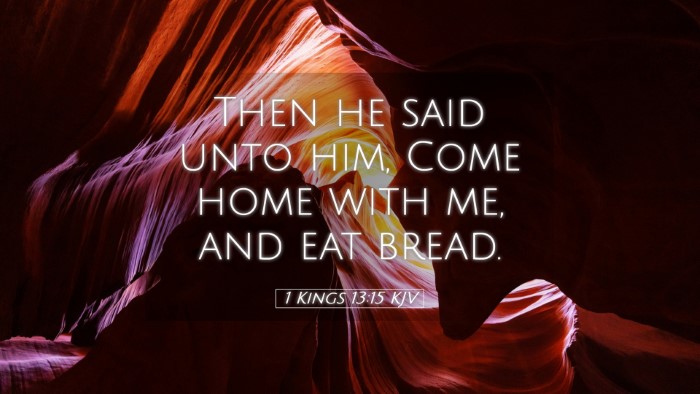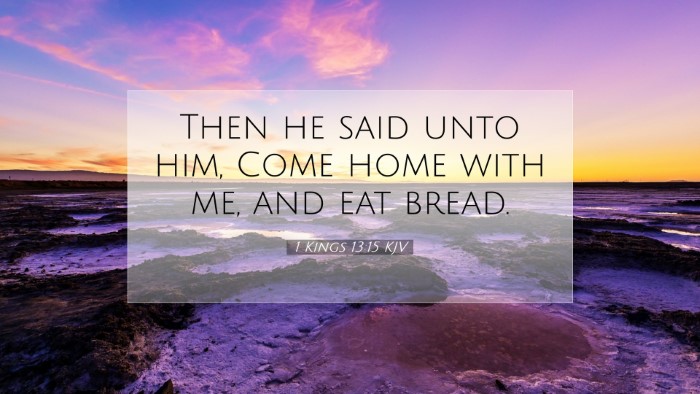Commentary on 1 Kings 13:15
Verse: "Then he said unto him, Come home with me, and eat bread." (1 Kings 13:15)
Introduction
This verse captures a pivotal moment in the narrative of the man of God from Judah. Following his prophetic act against King Jeroboam, an invitation is extended to him, which sets the stage for a profound lesson on obedience, divine authority, and prophetic integrity. This commentary integrates insights from Matthew Henry, Albert Barnes, and Adam Clarke to provide a comprehensive understanding of the implications of this verse.
Contextual Background
In the preceding chapters, we witness the establishment of Jeroboam's kingdom and his subsequent idolatry, leading to God's judgment. The man of God, sent from Judah, confronts Jeroboam at Bethel, prophesying the upcoming judgment against the altar where Jeroboam had instituted idol worship. After this dramatic prophetic declaration, the subsequent invitation to dinner offers a critical moment to consider obedience versus temptation.
Matthew Henry’s Insights
Henry emphasizes the importance of context when interpreting this verse. The man of God was on a divine mission but immediately faced the allure of comfort and fellowship. Henry notes, "There are many invitations and temptations to forsake the work of God." The invitation portrays a common struggle for believers: remaining steadfast in their commitment to God amidst various enticements. Henry stresses that true prophets and servants of God must remain vigilant against such distractions, ensuring their primary allegiance lies with divine instruction.
Albert Barnes’ Reflections
Barnes delves deeper into the implications of the invitation itself. He reflects on the actions of the old prophet, who initiates the invitation with an air of authority. His words, "Come home with me," suggest a certain familiarity and established rapport. Barnes warns of the subtle danger present in this invitation—the risk of being swayed by those who appear righteous but operate outside true divine direction. He notes that the man of God's initial refusal illustrates a necessary caution against the seductive nature of social and religious companionship that may lead one away from strict adherence to God's commands.
Adam Clarke’s Analysis
Clarke provides an analysis of the social dynamics at play. He remarks, "The offer of hospitality was not given lightly but came with expectations." Clarke asserts that the role of hospitality in ancient cultures imbues this request with weight. It is not just a mere invitation; it encapsulates a deeper temptation to compromise one's mission. He elucidates that the man of God must discern when the goodwill of others conflicts with divine mandates, asserting, "To follow man, even when it seems benevolent, can lead to disobedience against God."
Theological Implications
The theological ramifications of this verse echo throughout scripture. The tension between divine obedience and human relationships is a recurring theme in biblical narratives. It raises several reflective questions for pastors, theologians, and students of the Word:
- How do we discern when to accept invitations that may compromise our calling?
- What safeguards do we implement to ensure our commitment to God remains uncompromised?
- How does the invitation to dine symbolize the broader temptations we encounter as believers?
Conclusion
1 Kings 13:15 serves as a profound reminder of the inner battles faced by those called to serve God. The invitation to dine, while seemingly innocuous, embodies the vital struggle between faithfulness to God and the allure of human companionship. As we reflect on the insights from Henry, Barnes, and Clarke, we are encouraged to pursue steadfastness, to recognize the subtleties of temptation, and to remember that our ultimate allegiance must remain to God alone. The words of Jesus resonate here: “Man shall not live by bread alone, but by every word that proceeds from the mouth of God” (Matthew 4:4), reminding us of the necessity of prioritizing divine command over earthly invitations.


